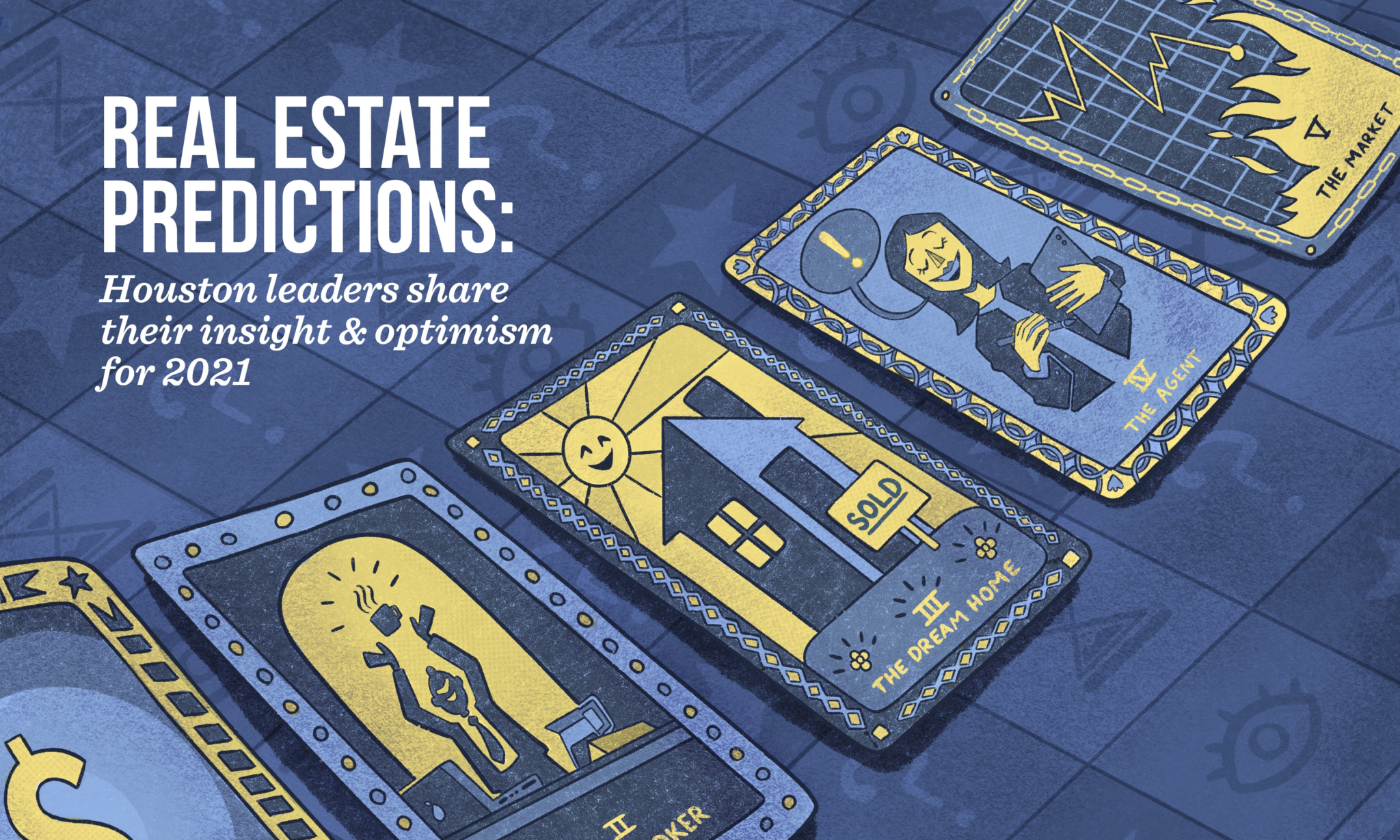Happy days are here again in 2021? With a vaccine making its way across the globe at lightening speed, there appears to be a light at the end of the pandemic tunnel, but what does the future hold for residential real estate? We spoke with some of Houston’s real estate leaders to get their take on 2021.
Our panel this year includes:
- Kirsten Abney, CRP, sales associate, Better Homes and Gardens Real Estate Gary Green
- Peter Barnhart, executive vice president and partner, Caldwell Communities
- Matt Kiker, president, Network Funding
We’ve all been weathering the changes that COVID-19 brought into our lives. What revelations have you learned about your business over the last year? Will any of this apply to the way you do business in the future?
Kirsten Abney, CRP, sales associate, Better Homes and Gardens Real Estate Gary Greene: Everything we have learned through this pandemic will apply in some way to how we do business in the future. For me, this year has reinforced how critical it is to focus on the positive. Work on the aspects of your business that you can control and be willing to change, adapt and learn new approaches and technologies. The activities that generate business are still relevant, although how we approach them may be different and will likely continue to evolve. Connect with people and be a resource. Project a positive attitude and demeanor that will draw people to you.
Peter Barnhart, executive vice president and partner, Caldwell Communities: As a business leader, you always be prepared for a left-hand turn in the road.
Matt Kiker, president, Network Funding: In person or not, real estate financing still requires human interaction in order to make transactions move quickly and smoothly. Every buyer and borrower has a unique set of circumstances and each deserves the best education and service when making such a large financial commitment. We have to work at a distance, but we still need to work with one another.
Assuming we are still dealing with the pandemic for many months to come, what changes should we expect in the Houston real estate market in 2021? If a vaccine is distributed next year, what impact will that have on the real estate market?
Abney: I feel very optimistic about the Houston real estate market in 2021. There are many things we don’t yet know in terms of how our economy will ultimately be impacted with the COVID-19 and oil & gas related job losses, but current indicators and predictions remain positive for our market. As it relates to the vaccine specifically, I hope that we see inventory open up in our market. Some sellers are not comfortable with people coming into their homes at this time, so they have chosen to keep their homes off the market. Hopefully a vaccine will ease some of the concerns people have with putting their home on the market. This will open up more options for buyers who are ready to purchase.
Barnhart: I think we will continue to see a shift to the suburbs. This was already happening as the millennials finally realized that the best quality public schools are generally not in our city centers. Covid-19, along with historically low interest rates has continued to fuel that shift.
Kiker: The changes as far as showings and closings have taken place and we believe the measures taken have proven effective, especially those taken by Realtors and closing agents who have made the whole process safer for everyone. With online means of pre-qualification, like Network Funding’s Simpl platform, loan officers can work together with borrowers via phone or video conference. With a vaccine, many fears will be relieved and more in-person contact will make for more smiles that can be seen, as new homeowners will not be required to wear masks.
Do you think the trend of homebuyers leaving cities for suburban areas is real, and if so, do you think it will continue in 2021? Why?
Barnhart: I think the trend will continue because the quality of schools, safety, and ability to work from home make living in the suburbs a superior choice to dense urban living.
Abney: This is not a new trend, but it is very much real. For years we have seen buyers migrating from urban areas to more suburban areas and vice versa depending on what lifestyle needs are important to them at that time. What I have seen more during the pandemic is a desire for some buyers to move to more rural areas with larger tracts of land and a less dense population.
Kiker: The move from the city to outlying areas is real and will continue in 2021 because many businesses have found that employees are just as effective working from home as they are from the office. Houston may not experience the city to suburban move as much as cities with a higher density of downtown and near-town residents.
All things considered, do you expect your 2021 business to thrive, decline or remain stable? Why?
Abney: I expect 2021 to be a very strong year. Activity and interest in the market remains strong and my pipeline going into 2021 looks very good.
Barnhart: I think we will see more of the same for 2021: A robust housing market for entry level price points. Hopefully, a vaccine will get our local retail and restaurant establishments a much-needed boost.
Kiker: In Texas, we expect it to be stable with some possible, slight declines in Houston. According to data pulled from total USPS change-of-address requests filed between February 1, 2020 and July 31, 2020, Texas added a net of 30,603 residents, ranking third behind Michigan (45,408) and North Carolina (37,971). Employment in Texas overall has been outstanding. According to The Real Estate Center at Texas A&M University, unemployment in Houston went from 3.7% in September 2019 to 14.1% in May of 2020 to 9.6% in September of 2020. We do not expect unemployment to drop back to 4%, but with a vaccine, we do expect improvement.
What will be the biggest challenges and opportunities for agents, lenders and brokers in 2021?
Abney: For agents and brokers, I see the lack of inventory as the biggest challenge in 2021. Technology will continue to change at a rapid pace. Staying ahead of this curve has been and will continue to be a challenge for agents and brokers. In Houston, we are so fortunate to have HAR.com and the tools HAR provides agents. For lenders, I believe they will continue to see high demand given the low interest rates and keeping up with the demand will be their biggest challenge.
Kiker: Employment will be a challenge and inventories will be a challenge, especially as we enter the next buying season. We still have the lowest interest rates most of us will see in our lifetime and the agencies have all raised their maximum loan limits tremendously for 2021 making an opening for more buying power in the $500,000s.
How do you believe the markets will differ under a Biden presidency, if any?
Abney: It is really too early to say. Historically, our market slows down in the two to three months leading up to a presidential election. That was not the case this year. Our market has grown and prospered under many different presidents. Unless we see drastic changes that negatively impact our local economy, I don’t expect us to see big shifts in the market related to a Biden presidency.
Barnhart: I think there is such division in our federal government and in our nation as a whole that I don’t see either party being able to effect much structural change.
Kiker: We predict that inflation will stay low which will in turn provide low interest rates for the near future. A Biden administration may also increase government oversight, and therefore costs for mortgage banking activities, which may likely be passed on to consumers.
Where will the hottest communities and neighborhoods be in 2021?
Abney: Many areas and price ranges have seen strong activity this year. I expect we will continue to see strong activity in most areas and price ranges. Communities closely tied to Oil & Gas business centers may see some softening related to layoffs. Our low inventory is likely to lessen the impact in these areas.
Do you think consumers will get used to virtual showings enough to keep them as a regular practice?
Abney: Virtual showings are a great option and have been for years. As our technology continues to evolve and improve in this area, it enhances the experience for the consumer. The purchase of a home is the largest asset most people will make in their life. While there is a place for virtual showings, most people ultimately want to see a home in person before they make such a big decision.
Do you think the number of new people getting real estate licenses will grow in 2021?
Abney: Possibly. As we see people leaving other industries, this could be a career path we see people explore.
Do you see a possible wave of foreclosures coming? If so, how will it impact the industry?
Kiker: Yes — foreclosures, even foreclosures that should have begun before or during the pandemic, were halted with the CARES Act. Currently, the stay on foreclosures has been extended to January 31, 2021, and under a new administration, that date may be extended further. Although borrowers have had the opportunity to utilize the forbearance options provided by lenders, the day is coming when foreclosures will begin again. How quickly those foreclosures occur will depend on how quickly lenders can determine borrowers’ ability to repay missed payments and to keep their mortgages current.
We’ve been told that interest rates will remain low, so what should homebuyers be watching for regarding mortgages?
Kiker: The expectation of inflation is a key factor of interest rates. If world or national events give the indication that the prices we pay for goods and services is likely to rise significantly, then rates will rise. The other key factor is the interest rate paid by the United States on the debt it issues. Mortgage bankers typically watch the rate on a 10-year treasury note as an indicator of rates.
Is your company feeling increased demand due to low inventory? How is your company responding to the low available inventory?
Barnhart: Our inventory is low, and we are continuing to produce new lots in all of our award-winning communities.
What design changes, if any, have you incorporated into your floor plans because of the shift to work from home?
Barnhart: I have already seen some incredible plans that very thoughtfully create multi use spaces to allow remote learning and working.
What do you see happening with home prices in 2021?
Abney: I believe they will continue to increase in most areas and price ranges.
What does Houston need to do to address flooding issues?
Abney: Continue to do what they have been doing and work towards addressing potential future issues as best as possible. Finding a simple way to more broadly communicate and educate our residents on what has been done recently to address future flooding issues could have a very positive impact. This would be especially helpful to the areas that still carry a strong flooding stigma.




